Best indoor plant for hanging basket – Discover the best indoor plants for hanging baskets and elevate your home decor while improving air quality. From lush greenery to vibrant blooms, these plants offer a myriad of benefits and add a touch of nature to any space.
Whether you have bright, indirect light or low-light conditions, there’s a hanging plant perfect for your needs. Let’s explore the diverse options available and find the ideal plants to enhance your indoor environment.
Popular Indoor Hanging Plants for Various Environments
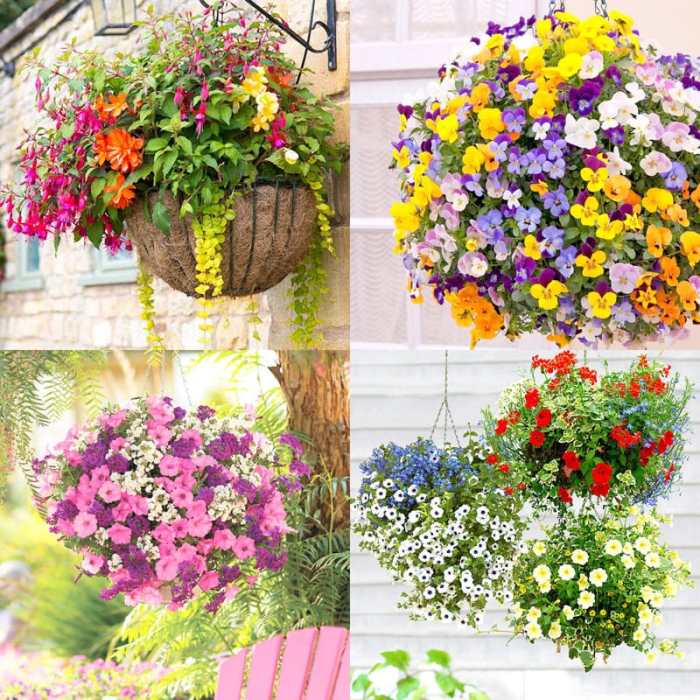
Indoor hanging plants add a touch of greenery and life to any space. Whether you have a bright, indirect light or a low-light area, there are plenty of options to choose from. Here are some of the best indoor hanging plants for various environments:
For Bright, Indirect Light
- Spider plant: This easy-care plant is known for its long, trailing leaves and spiderettes (small plantlets that form at the end of the stolons).
- Pothos: Another low-maintenance plant, pothos is known for its heart-shaped leaves that come in a variety of colors.
- ZZ plant: This drought-tolerant plant is perfect for those who forget to water their plants. Its glossy leaves add a touch of elegance to any space.
For Low-Light Conditions
- Snake plant: This tough plant is known for its upright, sword-shaped leaves. It can tolerate low light and infrequent watering.
- Peace lily: This beautiful plant has dark green leaves and white flowers. It prefers low light and moist soil.
- Cast iron plant: This almost indestructible plant is known for its tough, dark green leaves. It can tolerate low light and infrequent watering.
For High-Humidity Areas
- Boston fern: This delicate fern has long, feathery fronds. It prefers high humidity and indirect light.
- Staghorn fern: This unique fern has large, antler-shaped fronds. It prefers high humidity and bright, indirect light.
- Maidenhair fern: This delicate fern has thin, wiry fronds. It prefers high humidity and filtered light.
Unique Foliage and Flowers for Visual Appeal
Hanging plants offer not only a touch of greenery but also a vibrant display of unique foliage and flowers. From variegated leaves to unusual leaf shapes and textures, these plants add a striking element to any indoor space.
Variegated Leaves
Variegated hanging plants feature leaves with multiple colors or patterns, creating a mesmerizing effect. Some popular options include:
- Pothos ‘Marble Queen’: Creamy white and green leaves
- Spider Plant ‘Variegata’: Green leaves with white stripes
- Philodendron ‘Birkin’: Dark green leaves with light green veins
Unusual Leaf Shapes and Textures
Hanging plants with unusual leaf shapes or textures add an intriguing touch to any room. Some notable examples include:
- String of Hearts: Heart-shaped leaves on long, trailing stems
- Staghorn Fern: Forked fronds that resemble antlers
- Bird’s Nest Fern: Cup-shaped fronds that collect water and debris
Colorful Flowers
For a burst of color, consider hanging plants that produce vibrant flowers. Some popular choices include:
- Fuchsia: Bell-shaped flowers in shades of pink, purple, and red
- Petunia: Trumpet-shaped flowers in a wide range of colors
- Calibrachoa: Small, trumpet-shaped flowers that resemble mini petunias
Air-Purifying Benefits of Hanging Plants
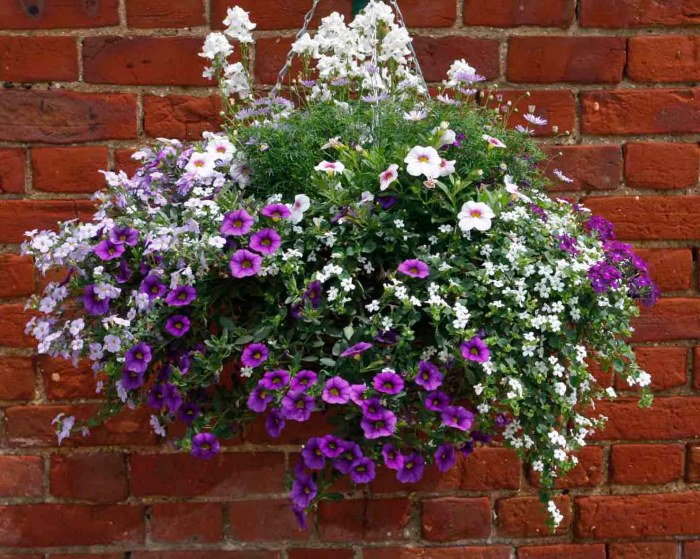
Hanging plants not only enhance the aesthetics of a room but also offer significant air-purifying benefits. These plants have the ability to remove harmful indoor air pollutants, creating a healthier and more comfortable environment.
Specific indoor air pollutants that hanging plants can remove include:
- Benzene
- Trichloroethylene
- Formaldehyde
- Ammonia
- Xylene
Comparative Table of Air-Purifying Capabilities
The air-purifying capabilities of different hanging plants vary. The following table compares the effectiveness of some common hanging plants:
| Plant | Benzene | Trichloroethylene | Formaldehyde | Ammonia | Xylene |
|---|---|---|---|---|---|
| Spider Plant | Excellent | Good | Fair | Poor | Poor |
| Snake Plant | Excellent | Excellent | Excellent | Good | Good |
| Peace Lily | Good | Good | Good | Excellent | Fair |
| Pothos | Good | Good | Good | Fair | Good |
| Golden Pothos | Good | Good | Good | Fair | Good |
Note: Ratings are based on studies conducted by NASA’s Clean Air Study.
Ideal Placement for Maximum Air Purification
To maximize the air-purifying benefits of hanging plants, it is important to place them strategically:
- Near sources of pollution:Place plants near windows, doors, or areas where pollutants are likely to enter the room.
- In high-traffic areas:Hang plants in hallways, living rooms, or other areas where people spend a lot of time.
- At different heights:Hang plants at varying heights to ensure that they are purifying the air throughout the entire room.
Plant Care and Maintenance for Hanging Baskets
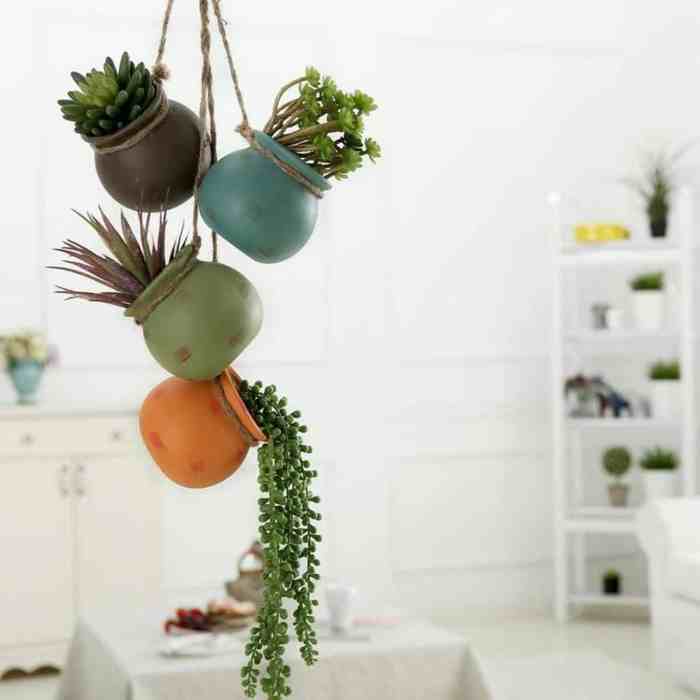
Hanging plants add a touch of greenery and life to any space, but they require specific care and maintenance to thrive. Watering, fertilizing, and ensuring proper drainage are crucial for their health. Additionally, managing pests and diseases is essential to keep these plants looking their best.
Watering
Hanging plants have a smaller soil volume than potted plants, so they dry out more quickly. Water them thoroughly when the top inch of soil feels dry to the touch. Avoid overwatering, as this can lead to root rot.
The best indoor plant for hanging baskets is one that is both beautiful and easy to care for. Some of the best options include pothos, philodendron, and spider plants. These plants are all known for their trailing vines, which can create a stunning effect when hung from a basket.
For those looking for a more dramatic look, consider best cascading indoor plants such as ferns or ivy. These plants have long, flowing stems that can cascade down the sides of a basket, creating a lush and eye-catching display.
Fertilizing
Fertilize hanging plants every two to four weeks during the growing season with a balanced liquid fertilizer. Follow the instructions on the fertilizer label for dilution and application rates.
Drainage
Proper drainage is essential for preventing root rot. Choose hanging baskets with drainage holes and use a well-draining potting mix. If the basket does not have drainage holes, you can create some by poking holes in the bottom with a sharp object.
Root Health, Best indoor plant for hanging basket
Inspect the roots of hanging plants regularly for signs of rot or damage. If you notice any brown or mushy roots, trim them off with a clean pair of shears.
Pests and Diseases
Hanging plants are susceptible to the same pests and diseases as other indoor plants. Aphids, mealybugs, and spider mites are common pests. Treat infestations with insecticidal soap or neem oil. Fungal diseases, such as powdery mildew and botrytis, can also affect hanging plants.
Treat these diseases with a fungicide.
Creative Hanging Basket Designs and Inspiration
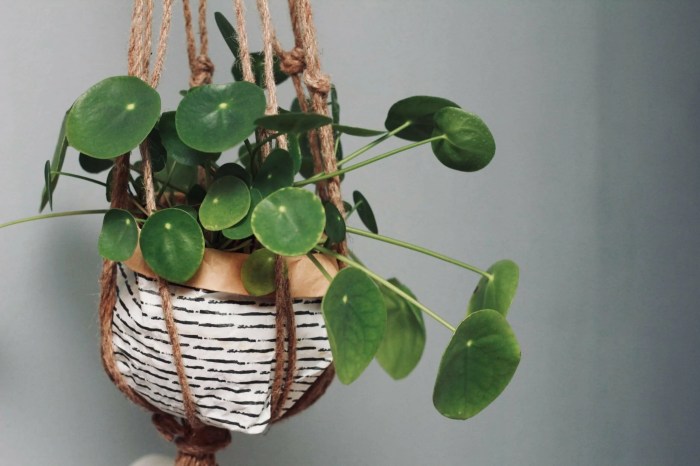
Hanging baskets are a versatile and stylish way to add greenery to any space. They can be used to create vertical gardens, add a touch of color to a room, or simply provide a home for your favorite plants. With a little creativity, you can create a hanging basket that is both unique and beautiful.
One of the most popular ways to create a hanging basket is to use macrame. Macrame is a type of knotting that can be used to create a variety of different patterns and designs. Macrame hanging baskets are often made with natural materials, such as cotton or jute, and they can be hung from the ceiling or from a hook on the wall.
Another popular option for hanging baskets is to use rope. Rope hanging baskets are typically made with a sturdy type of rope, such as nylon or polyester, and they can be hung from the ceiling or from a hook on the wall.
Rope hanging baskets are a great option for outdoor use, as they are weather-resistant and durable.
If you’re searching for the best indoor plant for hanging baskets, consider exploring the world of best draping houseplants . These plants feature cascading foliage that gracefully spills over the edges of baskets, creating a lush and elegant display. Some top choices for hanging baskets include pothos, spider plants, and ferns, known for their ability to thrive in various lighting conditions and purify the air.
In addition to macrame and rope, there are a number of other materials that can be used to create hanging baskets. These materials include wire, metal, and even wood. With a little creativity, you can create a hanging basket that is both unique and beautiful.
Vertical Gardens
Hanging baskets can be used to create vertical gardens, which are a great way to add greenery to small spaces. Vertical gardens are typically made by hanging a series of baskets from the ceiling or from a wall. The baskets can be planted with a variety of plants, including herbs, flowers, and vegetables.
Vertical gardens are a great way to add a touch of nature to any space. They can also be used to grow food, which is a great way to save money and eat healthier.
Hanging baskets bring life and greenery indoors, but choosing the right plants is crucial. For low-light environments, consider the best hanging indoor plants for low light , such as ferns, pothos, or peace lilies. These plants thrive in indirect light and add a touch of elegance to any hanging basket, creating a vibrant indoor oasis.
Decorative Accents
Hanging baskets can also be used as decorative accents in different room settings. For example, a hanging basket filled with flowers can add a touch of color to a living room or bedroom. A hanging basket filled with herbs can add a touch of freshness to a kitchen.
And a hanging basket filled with succulents can add a touch of whimsy to a bathroom.
Hanging baskets are a versatile and stylish way to add greenery to any space. With a little creativity, you can create a hanging basket that is both unique and beautiful.
Wrap-Up
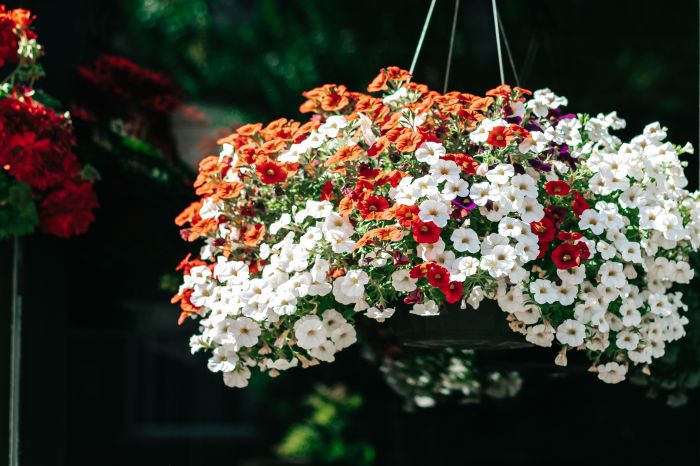
Incorporating hanging plants into your home not only adds aesthetic appeal but also provides practical benefits. Their air-purifying abilities help remove pollutants, creating a healthier indoor environment. With proper care and maintenance, these plants will thrive and bring lasting beauty and well-being to your space.
Questions and Answers: Best Indoor Plant For Hanging Basket
What are the best hanging plants for low-light conditions?
Spider plants, ZZ plants, and snake plants are known for their tolerance to low-light environments.
Do hanging plants need special care?
While most hanging plants have similar care requirements as other indoor plants, they may require more frequent watering due to faster soil drying.
Can hanging plants be used to create vertical gardens?
Yes, hanging baskets can be arranged vertically on walls or trellises to create stunning living walls that maximize space and add greenery.